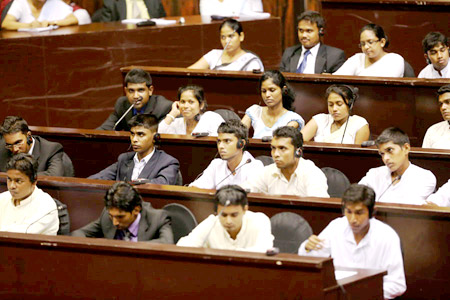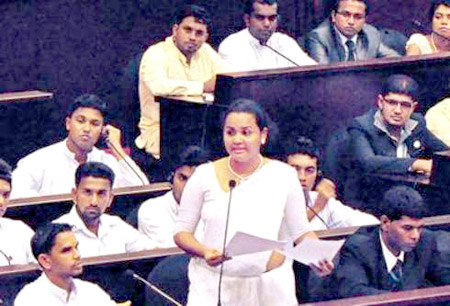|
Youth Parliament of Sri Lanka :
'This century of knowledge belongs to youth'
The skills of
the rural youth in sports, arts and cultural activities will be enhanced
by broadening and reorganizing the functions of the National Youth
Services Council. I propose to enhance the knowledge and experience of
youth by sending them on International Youth Exchange Programs.
-Mahinda
Chintana, Vision for the Future
by Sureshni Pilapitiya
|

' Youth parliament in session' |
The 10th session of the Youth Parliament got off with a bang with
many young aspiring politicians taking the floor. They debated their
guts out trying to be heard in the cacophony of voices. The Youth
Parliament was a more disciplined and subdued affair than Parliament
proper.
The objectives of the Youth Parliament is to develop leadership
skills of the Sri Lankan youth community and create a conducive
atmosphere, for them to identify hidden talent and competencies.
To create social harmony, mutual understanding and reconciliation in
the local youth community which was battered with 30 years of war, by
the second decade of the 21st century and also to educate the Sri Lankan
youth community on parliamentary proceedings, rules and regulations.
To develop practical knowledge in the youth community on issues and
challenges in the political sphere. To develop skills in recognising
things correctly, logical thinking and listening skills.
The National Youth Parliament consists of 412 members, of which 332
are elected by registered members of the NYSC Youth Clubs Network. Three
members are appointed by nomination of the Secretary of the Ministry of
Youth Affairs and Skills Development to support under-represented
stakeholders:
One youth parliamentarian to represent indigenous communities, one
member to represent people with disabilities and another member for
ethnic minorities represent the Sri Lanka Youth Parliament. Any
individual within the age group 18-39 can contest the elections for the
Youth Parliament.
This is also an opportunity for those who represent different
communities to speak on behalf of their communities ,the problems they
have to face, increasing the welfare of the people and sanitary and
infrastructure facilities.
|

A speaker at the Youth Parliament |
It is also an opportunity for youth of different ethnicities, races
and nationalities to get together as one and discuss about the country's
development by putting their ideas into action.
The Mahinda Chinthana has specially focused it's concern about the
youth and their future and has initiated programmes especially created
for the youth. The 10th session of the Youth Parliament proceeded on
similar lines as those of the Parliament of Sri Lanka . It was based on
“Reformation to the social youth enterprise in accordance with
contemporary social requirements is topical or not topical”. an
interesting discussion was held on this subject and sometimes led to
heated argument between the members of the Youth Parliament.
A youth parliamentarian said, "Earlier youth did not have much
freedom but now they had the freedom and have developed academically as
well as technologically". Youth parliamentarians showed the potential
and ability to showcase their skills and talents as future leaders. The
'parliamentary secretary' and the 'speaker' were also present doing
their duty with the much respected mace before them.
Kavisha Madushani , who played the role of a ' cabinet'
representative , said people can have different opinions. According to
her there's development where youth. were concerned. She said it was
necessary to create youth societies in villages and schools. 'There are
no youth societies in some villages', talented young people in villages
should be introduced to the changes", she said. Officials who work with
youth should understand their ideas and feelings. It was an occasion
where one could gain immense knowledge of the capabilities of modern
youth of the country.
The 10th session of the Sri Lanka Youth Parliament enabledng the
young parliamentary members to express their ideas and views regarding
social problems. It certainly will give an opportunity to those who are
keen on joining this field to show their leadership abilities to the
fullest extent.
The 10th session of Sri Lanka Youth Parliament was held on August 30
and 31 2014 at the Sri Lanka Youth Centre in Maharagama. The second day
of the Youth Parliament was graced by Defence Secretary Gotabhaya
Rajapaksa as chief guest and also parliamentarians J . R. P
Sooriyapperuma, A. H. M Azwer, Secretary to the Ministry of Law and
Order, M,ajor General (Rtd) Nanda Mallawarachchi, Secretary to the
Ministry of Youth Affairs and Skills Development , B. Wijerathne,
Military Liaison Officer of the Defence Ministry Major General( Rtd)
Palitha Fernando, Chairman and the Director General of the National
Youth Services Council , attorney -at- law Lalith Piyum Perera, were
among the guests.
“Leaders must select right people to achieve their goal” said Defence
Secretary, Gotabaya Rajapaksa , addressing the gathering at the Youth
Parliament in Maharagama. Over 412 Youth Parliament members
participated. He also presented awards to several youth who had
performed well at international athletic events.
Referring to the leadership of President Mahinda Rajapaksa, he said,
‘’ to be a successful leader , you must have a vision embedded with a
mission to achieve the expected future target'’ . And speaking about the
necessity of engaging in extra curricular activities he said that sports
and other leadership building programs apart from theory-oriented
education was essential.
The Sri Lanka Youth Parliament was set up to empower youth coming
from different parts of the country and mould them into prominent
political figures.
This gives them the opportunity to take up the role of decision
makers and gives them first-hand experience in the democratic
decision-making process. It also helps them to set themselves as future
world leaders and make a change in the field of politics. The vision of
the Sri Lanka Youth parliament is to convert the Sri Lankan Youth
community to a responsible , respectable, and accountable democratic
social group . The inaugural session was opened by president Mahinda
Rajapaksa on May 20, 2013. |

